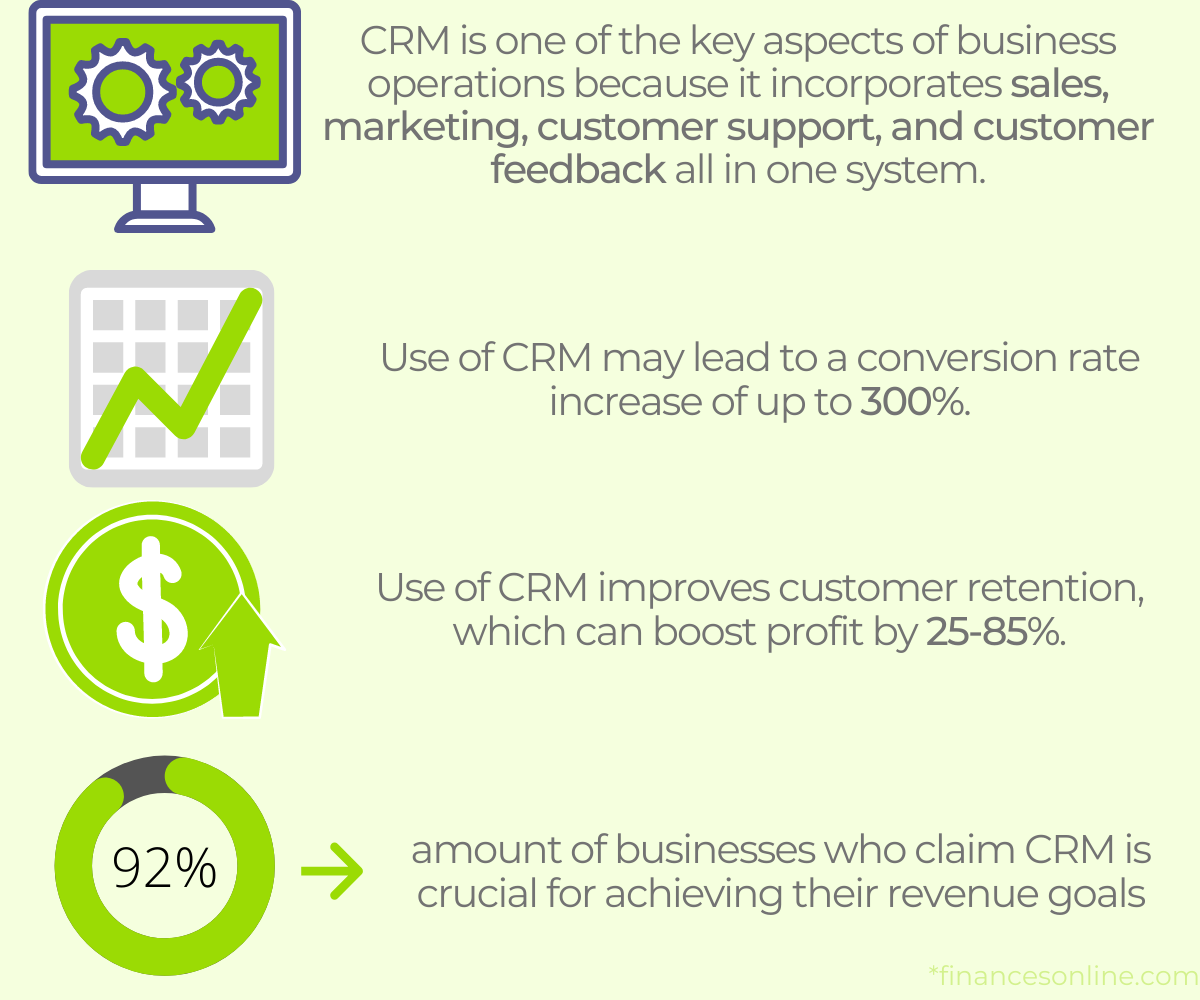Why CRM May Be Highly Effective for Your Business Success

Of all the things you need to do as a business to keep a competitive edge, putting customers first always takes the cake. The biggest challenge is to keep up with their ever-evolving needs and expectations, though.
Luckily, technology evolves just as rampantly, so there are a lot of tools out there that can assist you in your efforts to acquire customers and keep them happy and loyal to your brand. One of them is a CRM system. In this blog, we’ll see what it’s all about and how it can help you seize some market opportunities.
What does CRM stand for?
CRM stands for Customer Relationship Management and represents the process of using data to – yes, you’ve guessed it – manage relationships with your customers. When we talk about CRM, we are usually referring to CRM software, a tool that allows you to collect, organise and analyse valuable information about your audience.
Should you consider implementing a CRM?
As you’ll see in the remainder of this blog, there are some pretty powerful benefits in using a CRM system. However, it’s not necessary for every type of business and goals. Let’s shed light on some of the scenarios in which you would definitely benefit from CRM software implementation.
1. You are a B2B company.
B2B companies typically have a long sales cycle and involve communication with multiple decision makers. There are usually more requirements to take into account than with an individual customer, so the B2B model is quite complex overall. With the purpose of CRM being to simplify processes, it’s easy to see why this software can help B2B firms stay ahead of the game.
2. You receive a lot of data that is hard to keep track of.
Whichever sector and business model you belong to, if you’re feeling overwhelmed by the amount of data you’re accumulating and cannot memorise all your prospects, it’s a sign you might need a CRM to give you a little push.
3. Your sales and marketing teams need a little help with structure and productivity.
Being customer-centric is a must nowadays, but consistency can get pretty tricky. This is particularly due to the rapid shifts in expectations, desires and trends among consumers. Understanding these changes is a fundamental part of both sales and marketing.
With the competition so fierce nowadays, there is absolutely no room for guesswork. If your sales team does not quite have a structured approach, i. e. they are “winging it”, they might be in need of a CRM. The software provides them with all the insights they need to analyse consumer trends and spot more sales opportunities, including up-sell and cross-sell as well.
In the same way, a CRM will support your marketing efforts. It’s easier for your marketers to spot and target the right audience in the right way, and their collaboration with the sales team is stronger.
4. Interaction with your customers is not seamless.
Oftentimes there will be several touchpoints and communication channels between prospects and a business. A lot can get lost in multichannel interactions, which may cause frustration for customers and loss of sales opportunities and productivity for you. So, it is on you to give your customers a journey that will be as smooth as possible, especially since 90% of consumers expect a consistent omnichannel experience.
A properly integrated CRM software stores all interactions across platforms, making seamless communication with customers easier and thereby boosting your teams’ efficiency. Besides, almost 3 out of 4 customers expect service agents to already have information about their previous interactions with the brand, so it’s a plus for general customer experience and retention as well.
5. You are a membership organisation.
In our blog about membership success online, we emphasised setting up a CRM or AMS (Association Management Software) as one of the most powerful ways to boost member engagement and retention. That’s because all of the tracking and reporting opportunities, which allow you to understand your members and their expectations better and identify ways to improve their satisfaction and loyalty.
It is worth emphasising that you probably don’t need a CRM if you don’t receive an unmanageable amount of data, your sales cycles are really short, or you have no repeat business. This is not to say that you don’t still have to make sure you’re effectively keeping track of your customers’ needs and doing your best to give them a fantastic experience with your brand, though.
Advantages and disadvantages of customer relationship management
There are plenty of benefits you can look forward to with a properly integrated, robust CRM software, and you’ve already taken a peek at some of them above.
Essentially, what a CRM does is gather all the insights about your customers that you could possibly need. With the customer being the central concern of any business, you can already see how this matters to you.
It records customer contact details, purchase history, interactions across channels (e-mail, phone, chat, etc.), and even customers’ social media information, such as interests, likes and dislikes. At first glance, this may not seem like much, but it can definitely bring your business growth a long way.
So, let us summarise the key advantages of CRM tools:
- A centralised hub of data about your audience
- Easier segmentation and targeting
- A stronger relationship with customers
- An increase in conversions and sales opportunities
- An increase in customer retention
- More productivity and efficiency at an organisational level
- Better and faster communication with customers
- Marketing automation
- Scalability
- Personalised outreach
- Facilitated forecasting and reporting
- An increase in customer loyalty
- Overall product/service quality improvement
If you’re still not convinced, worry not. As usual, we’ve assembled some significant facts to back up our claims. With the image below, we wrap up our talk about the advantages of using a CRM.
As great as all of this sounds, CRM software is not entirely without flaw. There can very well be a few cons you should look out for. These are the main ones:
- Potential security issues
- Staff training and upskilling (may be time-consuming)
- Dependence on proper setup and handling
These disadvantages can, of course, be avoided if you make sure to consult an expert digital agency that is well-versed in CRM software development and integration. Ultimately, you might not even need a CRM, but another, more suitable kind of software.
If you do decide to invest in a CRM, then make sure to choose wisely.
How to choose a CRM system for your business?
We’d like to briefly go over a few things you should definitely consider in the process of selecting a CRM software to streamline your business.
- CRM accessibility (on-premise, cloud-based or web-based)
- The vendor’s reputation
- The cost of each CRM and what’s included in the price
- Technical support for the CRM
- The learning curve
- CRM features in relation to your business goals
- Compatibility with your other applications
- Demo/free trial
- The prevalent industry among the vendor’s buyers
Finally, even if there is no out-of-the-box solution you’re fully sold on, you can always consider custom CRM software development to get a bespoke build that uniquely fits your business.
Summary
As we’ve seen, CRM software is probably the right solution if you’re looking to streamline internal processes, gather detailed insight into your customers, leverage leads, seize sales opportunities and build a strong relationship with your customer base.
If you’d like more information about CRM software or you’re looking an expert to help you integrate a CRM into your business strategy, feel free to reach out to us. Digital agency GRM Digital are here to provide professional consultancy and CRM implementation/development services and help you grow.

